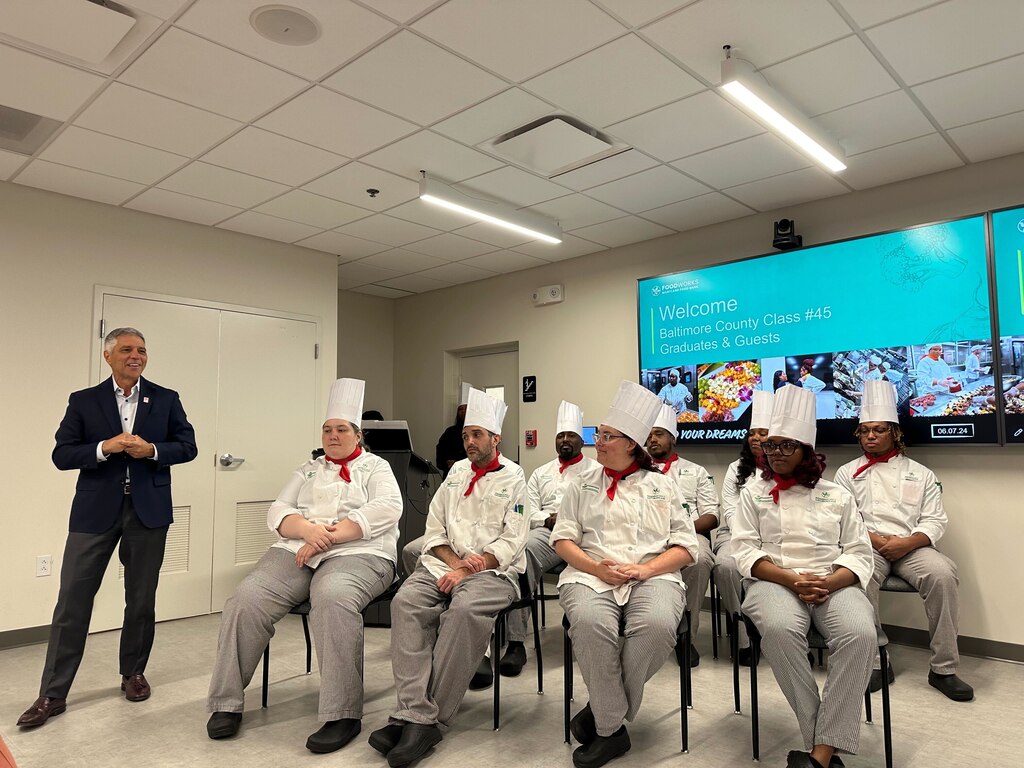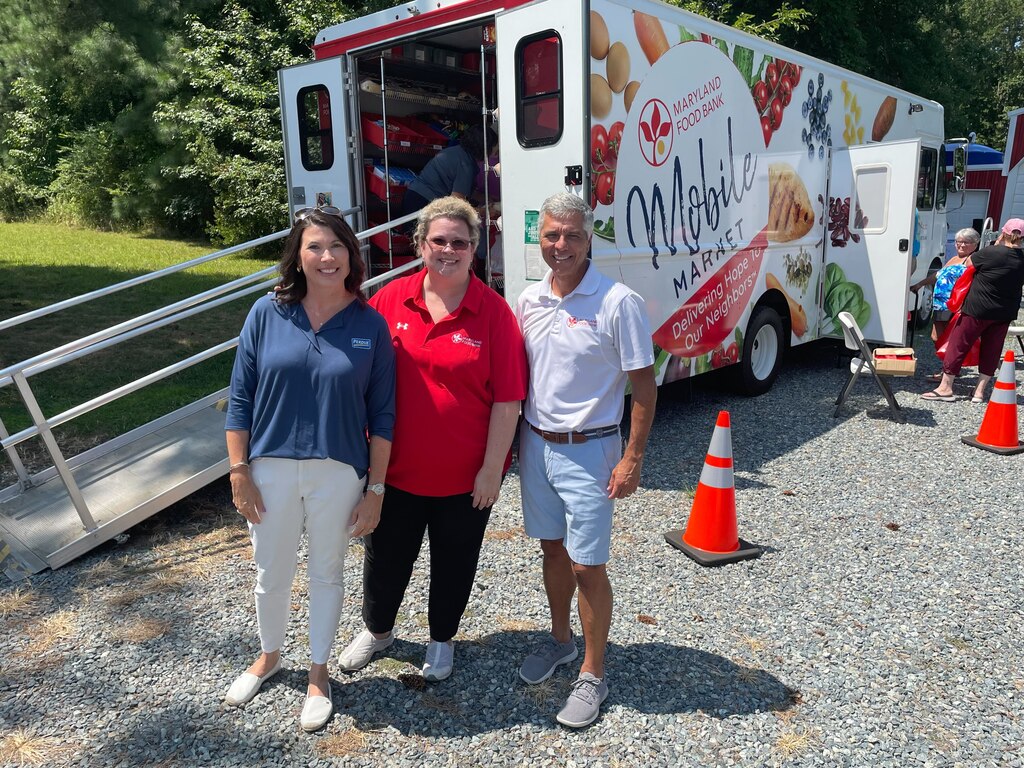After eight years leading an organization fighting hunger and food insecurity in the state, Carmen Del Guercio is stepping down as CEO of the Maryland Food Bank.
The nonprofit announced Tuesday that Del Guercio is departing his role on June 30. Del Guercio has been leading Maryland Food Bank, one of the largest nonprofits in the Baltimore region, since 2016.
“Leading the Maryland Food Bank has been the greatest honor of my career,” Del Guercio said in a news release.
Del Guercio joined Maryland Food Bank after a nearly 30-year career in banking and a brief period on the nonprofit’s board. His tenure was defined by the COVID-19 pandemic, which he believes pushed the organization to be more innovative, and a $5.3 million renovation to their Halethorpe location.
The Baltimore Banner thanks its sponsors. Become one.
A little over 10% of Maryland households were food insecure between 2021 and 2023, according to data from the U.S. Department of Agriculture. Since then, issues related to hunger have been compounded by cuts to federal food assistance funding and increasing food prices — which the USDA predicts will increase 2.2% this year.
Organizations like the Maryland Food Bank aid the state in addressing hunger. The nonprofit, which was founded in 1979, supplies food to thousands of community- and faith-based organizations, pantries and soup kitchens. Over the years, it has grown from serving 400,000 pounds of food annually to 52 million pounds of food.
Read More
Maryland Food Bank said its board initiated a search for Del Guercio’s replacement.
The Baltimore Banner spoke with Del Guercio about his time leading the Maryland Food Bank. The following interview has been edited for clarity and length.
The Baltimore Banner: What was your initial vision for Maryland Food Bank when you stepped into the role of CEO? How do you think you’ve achieved that vision?
The Baltimore Banner thanks its sponsors. Become one.
Carmen Del Guercio: One of the things that I really wanted to do was to be more market-driven — and this is where the for-profit background probably served me well.
We totally turned the organization sideways in the sense that we created a regional program structure. We have people specifically responsible for given geographies across the state where their primary function is to truly understand the need in those communities in a deeper way. So, when we put forth the solution, it’s not because somebody sitting in Halethorpe thinks it’s the best solution for Oakland. We understand the needs in Oakland.
Eight years ago, we distributed whatever food came in, kind of spread it like peanut butter across the state. We bought $6 million worth of food then. Today, we buy $22 million worth of food because we understand the needs across the state better. We know there’s certain types of food that resonate better with certain communities. We know the needs are deeper in some areas than others. And that regional structure we created, I took from my banking days.
The Banner: Sum up your tenure as CEO of Maryland Food Bank in three words.
Del Guercio: I can’t get three. I’m going to say more neighbor-centered and impactful. I think that’s how far we’ve come as an organization.
The Baltimore Banner thanks its sponsors. Become one.
The Banner: What are you most proud of?
Del Guercio: Expanding our root cause work is something I’m proud of. Some of the things we’ve done there include expanding our kitchen in Baltimore to accommodate larger classes for culinary training. We expanded our workforce development program into the Eastern Shore. We developed the Speakers Bureau, where we train cohorts of people with lived experiences to talk about their challenges as someone who can connect with neighbors and our partners. We started a new mobile market program to get trucks with fresh produce to people and create a shopping experience.
We are constantly surveying communities to ensure that, if we can reasonably access some culturally preferred product, we can provide that in certain communities. We have a hunger map on our website to really help us identify the areas in our state that have the greatest need. It’s a much more targeted, intentional approach to food distribution.
 Carmen Del Guercio with FoodWorks graduates in December 2024.
Carmen Del Guercio with FoodWorks graduates in December 2024. Carmen Del Guercio working with the Mobile Market in August 2023.
Carmen Del Guercio working with the Mobile Market in August 2023.The Banner: How did you all meet the moment of the pandemic? Did it change your approach to leadership?
Del Guercio: We made a purchase around March 7, 2020. I remember I got in a debate with my operations officer who said, “Hey, we needed to buy some food to stockpile,” and he wanted to spend $1 million, which would have been a big purchase for us.
The Baltimore Banner thanks its sponsors. Become one.
We came up with $500,000 because I said, “A worldwide pandemic. We’re going to have the best minds on this thing. This thing is going to be over by July 4, so $500,000 will be fine.” We ran out of $500,000 worth of food really fast. We had to scramble and try to find creative solutions, and I wish I had listened to him and bought a little bit more.
I think it affected the culture of our organization as a whole. The crisis forced us to make decisions faster, make decisions even if we did not have all the information at the time. We became less bureaucratic. We became much more agile.
The Banner: How have you seen food insecurity change in the state of Maryland?
Del Guercio: It’s grown. I think it’s affecting more working-class families today than it ever was in my eight years here. I believe our food bank has become a more accepted solution in the community out of sheer need.
Sometimes, a family may be too proud to go to a food pantry for help. We’ve been very focused on dignity and neighbor experience to ensure that, if someone shows up to one of our pantry sites, they’re treated with dignity and respect.
The Baltimore Banner thanks its sponsors. Become one.
The Banner: What else do you think needs to be done to address hunger in the state of Maryland?
Del Guercio: I think there’s going to be tremendous pressure on public funding. As we move forward, the state’s budgets are being challenged. There are programs at the federal level that are under constant scrutiny, like SNAP [Supplemental Nutrition Assistance Program]. Cuts to those programs are going to put tremendous pressure on the food assistance safety net as well as other nonprofits.
Financial support is going to be critical for the organization going forward in terms of its ability to continue to be able to respond to the needs. More visibility is needed. People feel good about the work we’re doing, but it doesn’t mean we don’t need their help.
The Banner: How do you feel about the scrutiny food assistance programs have come under as someone who has worked in the space?
Del Guercio: I’m very concerned about it. It seems like there’s unilateral decisions being made about certain policies and maybe segments of the government in terms of their value to our neighbors. SNAP, they do nine meals to every meal we provide. Cutting SNAP could have huge detrimental effects on food banks across the country in terms of their ability to respond and absorb that amount of demand.
The Baltimore Banner thanks its sponsors. Become one.
And the perception that those SNAP recipients aren’t buying healthy food, or aren’t buying food similar to what you and I are buying … their buying habits are not different. The fact that they have to rely on SNAP is something that is a function of all sorts of issues, many of which are systemic, many of which are out of their control.
The Banner: Understanding this, what advice do you have for those interested in stepping into your old role?
Del Guercio: There’s going to be some work that needs to be done to ensure the needs of the communities that we serve are represented and they have a voice. Create space for people with lived experience to have a voice and advocate for their needs.
I think you need a humble leader who’s comfortable sharing a spotlight and marshaling as many resources as possible. This is not a battle they can fight by themselves. They’re going to have to figure out a way to build a coalition and build a movement that allows them to address whatever comes down the pike today as well as in the future.
The Banner: What will you miss about being CEO of Maryland Food Bank?
Del Guercio: In 27 years of banking, I probably cried five times. I probably cry once a week here. Stories of people coming to say “thank you” and share how much we’ve influenced their lives. I see stories of people who say, “Hey, I used to be food insecure and now I’m no longer, and you’ve helped me. That’s why I’m writing you this check,” or, “I used to be food insecure, and that’s why I’m volunteering here.”
There’s not a week that goes by that I don’t try to find a way to connect with a partner or neighbor we’re serving just to understand what they’re seeing and what they’re hearing and how we’re doing. If you think about somebody who’s food insecure, they’re waking up every morning not really sure where their next meal is going to come from. Then, they get through the day somehow, and they wake up and do it again the next day. When you hear someone’s ability to overcome that, or you even hear the beautiful optimism they have despite the fact that they’re dealing with these issues, it’s truly energizing.
So, I’m going to miss those stories and those people and knowing that I played a small role in having some impact there. That’s part of the reason I expect I’ll be involved in some way, shape or form as a volunteer or any other way the food bank will let me because I’ve gotten so close to it. I realize the need is so great, and the impact we’re having is so great that I want to continue to play some role.




Comments
Welcome to The Banner's subscriber-only commenting community. Please review our community guidelines.